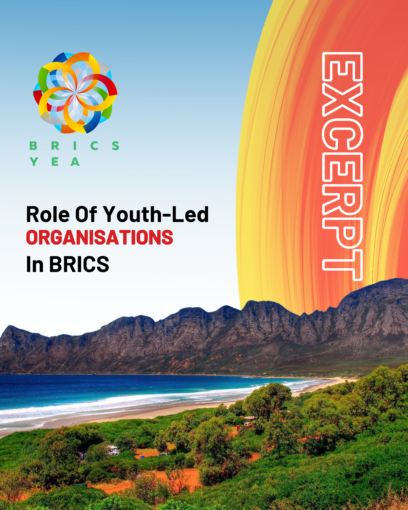
12 June 2023
The Role of Youth-led Organizations in BRICS
The BRICS (Brazil, Russia, India, China, and South Africa) countries are the world’s largest emerging economies and comprise more than 40 percent of the total world population. Hence, pertaining to their development needs and massive populations, the BRICS nations experience strong domestic net energy demands fulfilled mostly by conservative energy sources.
In fact, all the BRICS nations except South Africa feature among the top 10 energy consumers and also among the top 10 greenhouse gas emitting countries in the world. Therefore, they are more vulnerable to energy shocks and climate change in comparison to the advanced developed nations. This has been evident from the catastrophic impact that the pandemic and the recent geopolitical developments have had on the emerging economies.
In this realm, energy sustainability becomes an utmost priority for the BRICS nations, as they represent the concerns and interests of the developing countries as a whole. All the BRICS countries are committed to the climate and energy transition goals and are actively working towards their individual Nationally Determined Contributions (NDCs) to achieve net zero and energy sustainability targets. At the same time, through the BRICS multilateral forum, the member countries are determined to promote mutual cooperation in capacity building, policymaking, and technology sharing, establishing a resilient energy infrastructure for the developing world.
Apart from this, the BRICS countries have the youngest demography. Youth comprise the majority of the population in BRICS countries. The closely related issues of energy sustainability and climate change are of special concern for the youth as they have a multifaceted impact on employment conditions and quality of life. According to a report by the International Labour Organisation, adoption of sustainable practices as per the Paris Agreement will result in a net increment of approximately 18 million jobs in fields such as electric transportation and green businesses while also increasing energy affordability and leading to a better environment for the upcoming generations. Hence, youth engagement becomes both a necessity and an advantage to counter the energy challenges.
In recent years, the BRICS countries have witnessed the emergence of numerous youth led organisations that are making significant contributions in critical avenues of energy sustainability such as policy making, research, advocacy, community building, training, and education. These organisations are driving the energy transition by fostering innovation and exploring new sustainable energy practices, which include:
- Advocacy and Policy Making: The youth organisations engage with policymakers and take part in the decision-making process at the local and international level to encourage the adoption of sustainable practices in all areas of development.
- Knowledge sharing and skill building: Societal engagement is important in energy action. By organising workshops, seminars, and conferences, the youth organisations are raising awareness among all sections of society about energy sustainability. They are also contributing to capacity building by tapping into the talents of youth, minorities, and women and training them for green jobs in the future.
- Energy entrepreneurship and technology development: Through skill-building initiatives and extensive research, the youth organisations are introducing new business practices and technology models that can create green jobs for the youth and make energy more sustainable and affordable.
To encourage and appreciate the efforts of these youth organisations, BRICS have dedicated bodies such as BRICS International Youth Forum and the BRICS Youth Energy Agency. Under the BRICS framework, several youth-led events are also held to foster intra-BRICS bonds and knowledge sharing among the powerful youth of the BRICS nations. These events serve as a platform for dialogue and cooperation to overcome the common energy challenges in developing countries.
The BRICS YEA summit is one such event led by the BRICS Youth Energy Agency. The summit brings together international organisations, governments, companies, youth organisations, and other stakeholders championing the energy cause in the BRICS countries. The BRICS Young Scientist Forum is another platform that focuses on fostering collaboration and partnership among the young scientists and researchers in the fields of renewable energies, climate change, and energy innovation to overcome the shared scientific challenges in the developing nations. Another great initiative to encourage youth entrepreneurship in BRICS countries is the BRICS Youth Innovation Summit. The summit connects budding entrepreneurs with investors and experts from across the BRICS and global south, promoting innovations and new sustainable solutions in the vital areas of healthcare, energy sustainability, technology, and climate change. Such events facilitate dialogue among the young changemakers, harnessing the potential of the vibrant youth population to find sustainable energy solutions for the entire world.
The BRICS framework recognizes the importance of youth participation in addressing energy challenges and strives to empower the youth population, calling for their joint efforts in building a more inclusive and sustainable future. As the 2023 BRICS Youth Energy Agency summit is being held in South Africa it will substantiate and promote the interests of all the developing countries, especially from the global south. The summit will witness the participation of youth organisations from all the BRICS and other emerging economies. This year’s summit will focus on transforming Africa’s energy sector and accelerating the clean energy transition in Africa through youth action.
Thus, the summit will highlight the tremendous efforts of the youth organisations calling for even wider youth participation to translate their powerful voices into energy actions.
Author: Tanisha, The Geostrata
Share news


